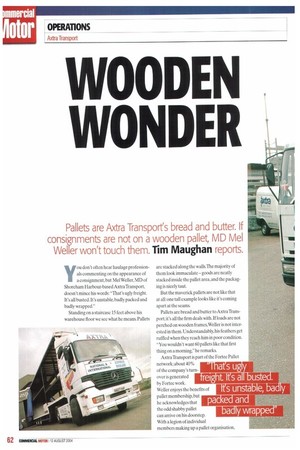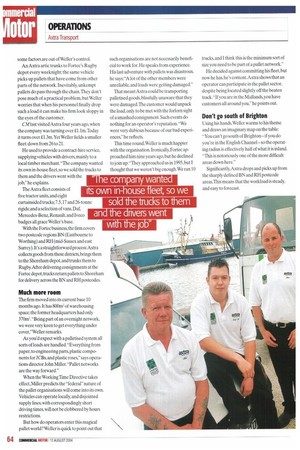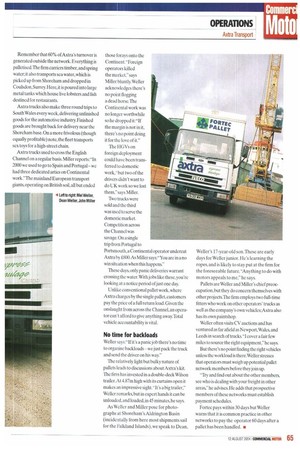WOODEN WONDER
Page 62

Page 64

Page 65

If you've noticed an error in this article please click here to report it so we can fix it.
Pallets are Axtra Transport's bread and butter. If consignments are not on a wooden pallet, MD Mel Weller won't touch them. Tim Maughan reports.
you don't often hear haulage professionals commenting on the appearance of a consignment, but Mel Weller, MD of Shoreham Harbour-based Axtra Transport, doesn't mince his words: "That's ugly freight. It's all busted. It's unstable. badly packed and badly wrapped."
Standing on a staircase 15 feet above his warehouse floor we see what he means. Pallets are stacked along the walls. The majority of them look immaculate — goods are neatly stacked inside the pallet area, and the packaging is nicely taut.
But the maverick pallets are not like that at all: one tall example looks like it's coming apart at the seams.
Pallets are bread and butter to Axtra Transport; it's all the firm deals with. If loads are not perched on wooden frames,Weller is not interested in them. Understandably, his feathers get ruffled when they reach him in poor condition. "You wouldn't want 60 pallets like that first thing on a morning," he remarks.
Axtra Transport is part of the Fortec Pallet network; about 40% of the company's turnover is generated by Fortec work.
Weller enjoys the benefits of pallet membership, but he acknowledges that the odd shabby pallet can arrive on his doorstep. With a legion of individual members making up a pallet organisation,
a s ugy reig t. I s a usted.
pac e an
some factors are out ofWeller's control.
An Axtra artic trunks to Fortec's Rugby depot every weeknight; the same vehicle picks up pallets that have come from other parts of the network. Inevitably, unkempt pallets do pass through the chain. They don't pose much of a practical problem, but Weller worries that when his personnel finally drop such a load it can make his firm look sloppy in the eyes of the customer.
CM last visited Axtra four years ago, when the company was turning over £ 1 .1m.Today it turns over El .3m. Yet Weller fields a smaller fleet: down from 26 to 21.
He used to provide a contract-hire service, supplying vehicles with drivers, mainly to a local timber merchant."The company wanted its own in-house fleet, so we sold the trucks to them and the drivers went with the job," he explains.
The Axtra fleet consists of five tractor units, and eight curtainsided trucks; 7.5,17 and 26-tonne rigids; and a selection of vans. Daf, Mercedes-Benz, Renault, and Iveco badges all grace Weller's base.
With the Fortec business, the firm covers two postcode regions BN (Eastbourne to Worthing) and RH (mid-Sussex and east Surrey). It's a straightforward process: Axtra collects goods from these districts, brings them to the Shoreham depotand trunks them to Rugby. After delivering consignments at the Fortec depot, trucks return pallets to Shoreham for delivery across the BN and RH postcodes.
Much more room The firm moved into its current base 10 months ago. It has 800m2 of warehousing space ; the former headquarters had only 370m2."Being part of an overnight network, we were very keen to get everything under cover,"Weller remarks.
As you'd expect with a palletised system all sorts of loads are handled:Everything from paper, to engineering parts, plastic components for JCBs, and plastic roses," says operations director John Miller."Pallet networks are the way forward."
When the Working Tune Directive takes effect, Miller predicts the "federal" nature of the pallet organisations will come into its own. Vehicles can operate locally, and disjointed supply lines, with correspondingly short driving times, will not be clobbered by hours restrictions.
But how do operators enter this magical pallet world? Weller is quick to point out that such organisations are not necessarily beneficial to work for. He speaks from experience. His last adventure with pallets was disastrous, he says: "A lot of the other members were unreliable, and loads were getting damaged."
That meant Axtra could be transporting palletised goods,blissfully unaware that they were damaged.The customer would unpack the load, only to be met with the forlorn sight of a smashed consignment. Such events do nothing for an operator's reputation."We were very dubious because of our bad experiences," he reflects.
This time round, Weller is much happier with the organisation. Ironically, Fortec approached him nine years ago, but he declined to join up: "They approached us in 1995, but I thought that we weren't big enough. We ran 10 trucks, and I think this is the minimum sort of size you need to be part of a pallet network."
He decided against committing his fleet, but now he has. he's content. Axtra shows that an operator can participate in the pallet sector, despite being located slightly off the beaten track."If you are in the Midlands, you have customers all around you," he points out.
Don't go south of Brighton
Using his hands. Weller warms to his theme and draws an imaginary map on the table: "You can't go south of Brighton if you do you're in the English Channel so the operating radius is effectively half of what it is inland. "This is notoriously one of the more difficult areas down here."
Significantly,Axtra drops and picks up from the sharply defined BN and RH postcode areas.This means that the workload is steady, and easy to forecast. Remember that 60% of Axtra's turnover is generated outside the network. Everything is palletised.The firm carriers timber, and spring water; it also transports sea water, which is picked up from Shoreham and dropped in Coulsdon,Surrey. Here, it is poured into large metal tanks which house live lobsters and fish destined for restaurants.
Axtra trucks also make three round trips to South Wales every week, delivering unfinished goods for the automotive industry. Finished goods are brought back for delivery near the Shoreham base. On a more frivolous (though equally profitable) note, the fleet transports sex toys for a high-street chain.
Axtra trucks used to cross the English Channel on a regular basis. Miller reports: "In 2000 we used to go to Spain and Portugalwe had three dedicated artics on Continental work."The mainland European transport giants, operating on British soil, all but ended those forays onto the Continent, "Foreign operators killed the market.says Miller bluntly. Weller acknowledges there's no point flogging a dead horse.The Continental work was no longer worthwhile so he dropped it:"If the margin is not in it, there's no point doing it for the love of it."
The HGVs on foreign deployment could have been transferred to domestic work," but two of the drivers didn't want to do UK work so we lost them.says Miller.
Two trucks were sold and the third was used to serve the domestic market. Competition across the Channel was savage. On a single trip from Portugal to Portsmouth, a Continental operator undercut Axtra by £800. As Miller says: "You are in a no win situation when this happens."
These days, only panic deliveries warrant crossing the water.With jobs like these, you're looking at a notice period of just one day.
Unlike conventional pallet work,where Axtra charges by the single pallet,customers pay the price of a full return load. Given the onslaught from across the Channel, an operator can't afford to give anything away. Total vehicle accountability is vital.
No time for backloads
























































































































































































